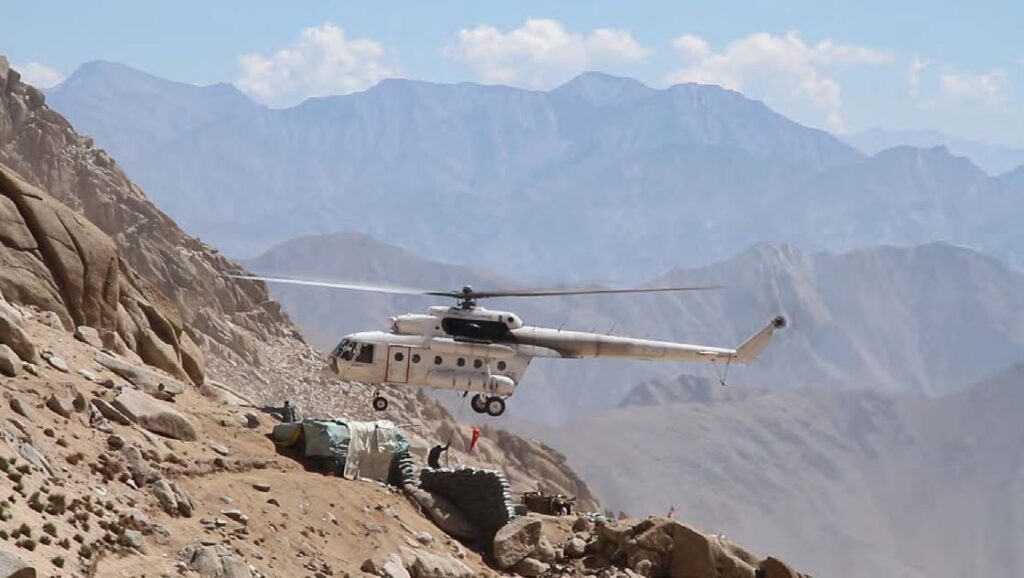By Ibrahim Jafari, Geologist, President & CEO of Afghanite Company, and President of the Mining Think Tank of Afghanistan.
This piece is meant to share a few examples of the latest technological innovations used in difficult-to-navigate areas of Afghanistan, demonstrating the complexities of key projects that have a massive impact on the infrastructure, economy, and future of the country.
Afghanite is a rare mineral known for its striking blue color that was first found in 1968 in Afghanistan. This resource is the inspiration behind the name of Afghanite Company. For the last five years, Afghanite company has been providing services to a number of mineral exploration projects such as Lalandar Chromite (resource drilling and testing), Koh-e Safi Chromite (magnetic survey, drilling, and testing), Takhar Salt (resource drilling), and Shaida Copper (environmental studies). Afghanite Company boasts considerable experience in the infrastructure sector, with a record of over a hundred projects from topography surveys to geotechnical investigation and design.
Among many other projects, Afghanite has handled the following mega projects in recent years:
1. Aerial LIDAR and Topography Survey of TAPI Pipeline Route in Afghanistan

Turkmenistan-Afghanistan-Pakistan-India (TAPI) Pipeline’s Aerial LIDAR has been the largest survey and mapping contractual project in Afghanistan to date. The TAPI pipeline is a 1,814 km trans-country natural gas pipeline running across four countries. The surveying and mapping of the TAPI Pipeline in the region used state-of-art technology by Afghanite Company and its partner companies (Genesys International Corporation Ltd. and CK Aerial Surveys). Despite the operational challenges of this highly sophisticated survey, the project was accomplished on time and with high accuracy.
2. Geotechnical Investigation of TAPI Pipeline Route in Afghanistan

TAPI Pipeline’s geotechnical investigation has been the longest route survey project of this type in Afghanistan, being 816 km in length. The project deploys two hundred engineers and technicians along this route with drilling rigs, excavators, and geophysical equipment.
3. Geotechnical Investigation of the New Salang Pass

Another advanced Geotech project led by the Afghanite Company was the drilling of nine deep boreholes at the highest peak of Salang pass. The project aimed to assess the possibility of establishing another tunnel next to the old Salang tunnel. The absence of ground access led the company to transport all equipment and consumables by helicopter. The high altitude of 4,000 m and harsh climate conditions made the helicopter’s operation almost impossible. While the project started in the hot season and continued for six months, a large portion of the drilling was done in the cold seasons under extremely low temperatures (-15° C). Measures such as keeping the drilling rigs running all day throughout the week, firing the coal in the water pools for water circulation, and providing special living facilities for workers over the drilling points were among the challenges of this project.
The company executed impressive contemporary practices such as close to 100 percent core recovery, triple tube wireline drilling, angular hole drilling, downhole televiewer survey, and sophisticated lab tests. Despite numerous obstacles, the completion of the project was a victory for the company and its partners.
4. Global Expertise and Local Capabilities to Boost Mining and Infrastructure

If this is your first time hearing the word telepresence; telepresence is the usage of virtual reality technology, especially for remote control of machinery or participation in distant events. This technology is prevalent in remote surgery operations where robotic hands, capable of performing operations, are guided by qualified doctors.
Due to security challenges in Afghanistan, most international companies cannot invest and operate inside the country despite their interest. This is regrettable as foreign investment in the extractive industry of Afghanistan could spur economic growth.
In many large-scale infrastructure projects, technical support from world-class companies could boost the project’s success, sustainability, and efficiency.
The risks involved in being physically present discourages global engineering firms from participating in infrastructure projects in Afghanistan.
Furthermore, the efficiency of their presence is undermined by high-security costs and travel limitations.
Companies in Afghanistan are unable to confidently take the first step in leveraging the nation’s vast mineral resources without international investments. There is a simple rule of thumb on gradual movement through different steps, from reconnaissance to exploration for making sure an area has enough capacity for being feasibly developed to a mine.
The competency and chain of custody of all activities are key elements of having acceptable resource estimation for most financial institutions and investing entities. To meet these vital requirements, a competent international entity should be involved in the activities and sign-off on reports. This element has been missing in Afghanistan due to a lack of local capabilities and as a result, Afghanistan’s world-class resources fail to attract the international financial market.
Afghanite, with proven experience in the extractive industry and access to a large pool of local experts – who can be mobilized all around Afghanistan -, has served as an example of a local partner to establish reliable telepresence in any location in Afghanistan.
Under the direction of a competent team, a partnership between international exploration companies or geological surveys and a local partner like Afghanite could open opportunities to conduct field activities and develop bankable reports to attract more interest from the capital market.
This business model would be a joint venture or partnership between international parties and a capable local partner who can follow rules and directions, record activities, travel anywhere within the borders of the country, and accomplish preliminary and main field activities. Afghanite’s operations have been the first of its kind in Afghanistan and of vital assistance to key national projects.




